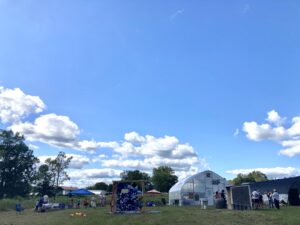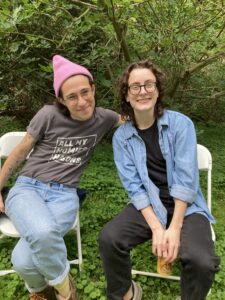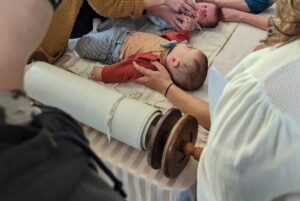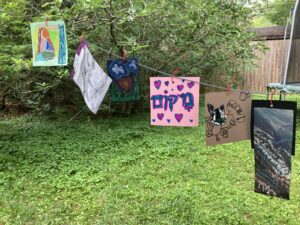Our Values
This statement of our values is intended as an ongoing reminder of what brings us together as a community. Having it written will help ground our decisions; it will live through our collective actions.
Our Context
These values come from our freedom dreams, our lineages, and from the challenges we face in the time and place in which we live. We are building Jewish community:
- in place: in diaspora, on Ye’sah land1, in the South; on colonized land that holds legacies of slavery;
- at a time of rising authoritarianism, white supremacist violence, destruction of the planet, and large-scale displacement locally and globally;
- in a period when Zionism has a hold on nearly all of U.S. Jewish and government institutions, and is presented as the only option for international Jewish safety;
- against generations of anti-Blackness and Christian supremacy that facilitated the assimilation of white Jewish communities and the shedding of traditions.
In this context, we come together with these values:
Our Values
Ge’ula and Geluta / Collective Liberation and Diaspora
We are building towards Olam Haba – the world to come, a world where we all have what we need to thrive. We are a diaspora Jewish community and we understand ourselves as a part of a wider web of communities and movements committed to ending white supremacy, fighting for queer & trans liberation, and calling for reparations2 and land back.3
We seek to live into a Judaism that upholds the liberation of all people. We are anti-Zionist, which means we support Palestinian self-determination and refuse to let our Judaism be a moral cover for apartheid. We belong to a growing movement of Jewish communities that do not materially, politically, or spiritually support Israel’s colonization of Palestine or ongoing oppression of the Palestinian people.
Kehillah4 / Belonging
We are committed to building a true kehillah/community. We believe that every person has inherent value and no one should be thrown away. We are Jews, we are non-Jews, we are fellow travelers. We don’t believe in a hierarchy of Jewishness based on observance, doctrines, background, or politics. There is no secret handshake to connect. We strive to unlearn the oppression that has made belonging in Jewish community difficult for many of us on the margins. We meet each other where we’re at and we bring each other along, welcoming one another as both hosts and guests, as individuals and a collective, a “We” in constant progress.
Makom / Honoring Place
We seek to honor the land on which we gather and the multiple stories it holds, including the peoples who have stewarded this land for millennia, the Black-led freedom movements rooted in the South, and the Jewish histories of this place. We tether ourselves to these histories, to their legacies, to our neighbors, and to each other. Jewish experiences of displacement and assimilation sometimes make us reject either our Judaism or the communities around us. We believe that rooting in both our Jewishness and our larger communities allows us to work in solidarity for the thriving of all.
Bein Kodesh L’Hol5 / Marking Time
While we are rooted in place, Jewish practice is rooted in time. We aim to be a community that moves in Jewish time. We gather together to mark, celebrate, mourn and bear witness to the cycles of our collective and individual lives along with the cycle of the year. Together we navigate leaning into the Jewish calendar, shabbat and our holy days, while living in a society that largely does not.
Torah / Tradition
We are part of many lineages: spiritual, cultural, chosen, received. We strive for connection with our ancestors and transcestors who have passed their Torah – stories, wisdom, and practices – to us. Our Torah is expansive: it is our sacred texts including the written Torah and the oral Torah;6 traditions of halacha7 and kabbalah8; ritual practices passed down lines of women and gender non-conforming people; family stories of joy, oppression, and survival; lessons learned from the natural world; and legacies of organizing in our families, in the South, in our ancestors’ many homelands.
Ma’aseh Bereshit / The Work of Creativity
We are creating the Judaism of our wildest dreams. We breathe new life into how we live our Torah. As creation is renewed each day, so is the way we practice together. We lean into the wisdom of our bodies as we partner with the Divine to generate new ideas, new music, reinterpretations of ritual, and as we cast off practices that no longer serve us. This is a joyful process, filled with song, celebration of simchas, beauty and abundant spirit.
Machloket l’shem Shamayim9 / Sacred Disagreement
Disagreement is part of the long history of our tradition: the Babylonian Talmud’s very structure uses debate to work out important issues, honors multiple voices, and preserves minority opinions. We orient toward multiplicity and strive to lean into conflict. We learn and grapple with Jewish traditions and texts. We honor diverse practices, experiences, and beliefs.
Tzitzit / Sacred Marginality
Tzitzit are the fringes on the four corners of a tallit (prayer shawl) or undergarment worn by many Jews. In prayer, tzitzit are gathered into one hand while reciting a line about gathering the dispossessed from the four corners of the earth. For millennia Jewish people have lived under empires, building and maintaining a rich Judaism in the face of oppression and repression. As queer and marginalized Jews and fellow travelers, we are in the lineage of a Judaism that recognizes the wisdom, vision, and creativity that can come from marginality. We are proud to be tzitzit, and to gather ourselves.
Tzedakah10 / Mutual Aid
We are dedicated to each other’s physical, emotional, and spiritual well-being. We prioritize accessibility, orienting toward community members’ access needs; and strive to distribute resources to support each other. We work towards a vision of community safety through solidarity where we keep each other safe.
Chesed and Gevurah / Care and Boundaries
When harm arises in our community, we act in compassionate accountability and accountable compassion. We seek to balance chesed (care) and gevurah (boundaries). We work to honor each other’s full humanity, “judge all people with the scale weighed in their favor” (Pirkei Avot 1:6), and address harm in a way that is rooted in Teshuvah.
Notes
1 We gather on the homelands of the Ye’sah: the Eno, Tutelo, Saponi, Occaneechi, and Shakori Native peoples. The Occaneechi Band of the Saponi Nation has a powerful land acknowledgement on their website.
2 To learn more about reparations, check out the Movement for Black Lives.
3 To learn more about landback, go to Landback.
4 Kehillah means community.
5 Bein kodesh l’hol means “between the sacred and the everyday.” This line is recited as part of havdalah, marking the end of Shabbat and the beginning of a new week.
6 Oral Torah refers to ancient Rabbinic texts, understood to have been revealed at Sinai along with the written Torah and passed down by oral tradition until they were recorded in the Mishnah, Talmud, and Midrash.
7 Halacha refers to a long tradition of Jewish practice and communal norms, and the recorded debate and discussion about that practice. Literally meaning “walking” or “going,” it is often defined as “Jewish law,” but as a system it functions very differently from contemporary state-based legal systems. Halacha has its roots in the Talmud and Jews today continue to build on this tradition today, creating new norms of practice.
8 Kabbalah, literally meaning “received thing,” refers to traditions of Jewish mysticism.
9 Machloket l’shem Shamayim, literally “disagreement in the name of heaven,” is an ancient concept in Judaism that refers to engaging in constructive conflict.
10 Tzedakah: Historically, in Jewish communities in Palestine and Babylonia, tzedakah was a community mutual aid fund, a practice of communal care rooted in relationships and our responsibility to each other. Today, it is often translated as “charity;” we reclaim it as mutual aid, noting also that it the root of the word also means “justice.”
